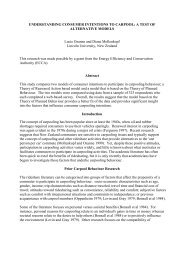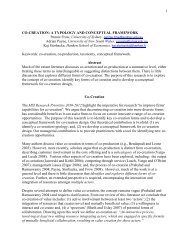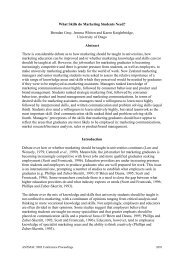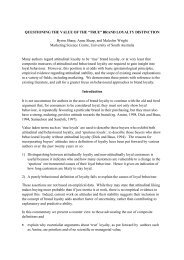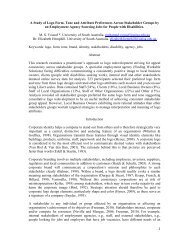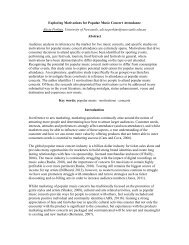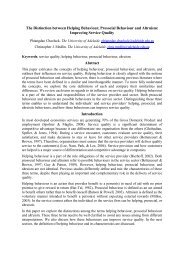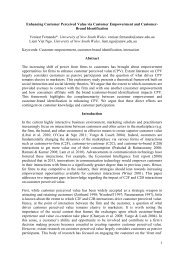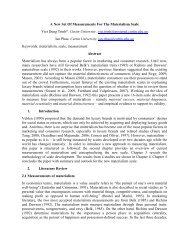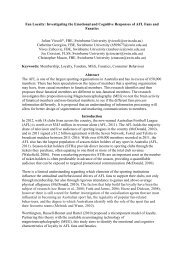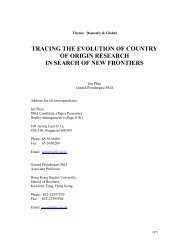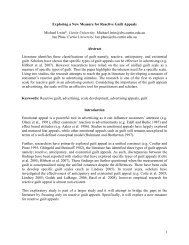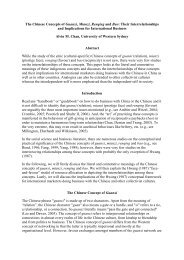realism rules ok: scientific paradigms in marketing ... - ANZMAC
realism rules ok: scientific paradigms in marketing ... - ANZMAC
realism rules ok: scientific paradigms in marketing ... - ANZMAC
You also want an ePaper? Increase the reach of your titles
YUMPU automatically turns print PDFs into web optimized ePapers that Google loves.
Table 1 Basic belief systems of alternative <strong>in</strong>quiry <strong>paradigms</strong><br />
Paradigm<br />
Item Positivism Realism Critical theory Constructivism<br />
Ontology naïve critical <strong>realism</strong>: historical <strong>realism</strong>: critical<br />
<strong>realism</strong>: reality is “real” but “virtual” reality relativism:<br />
reality is real only imperfectly shaped by social, multiple local and<br />
and<br />
and<br />
economic, ethnic, specific<br />
apprehensible probabilistically political, cultural, “constructed”<br />
apprehensible and and gender values, realities<br />
so triangulation crystallised over<br />
from many sources time<br />
is required to try to<br />
know it<br />
Epistemology objectivist:<br />
f<strong>in</strong>d<strong>in</strong>gs true modified<br />
subjectivist: subjectivist:<br />
objectivist: value mediated created f<strong>in</strong>d<strong>in</strong>gs<br />
f<strong>in</strong>d<strong>in</strong>gs probably f<strong>in</strong>d<strong>in</strong>gs<br />
true<br />
Methodology experiments/ case<br />
dialogic/dialectical: hermeneutical /<br />
surveys: studies/convergent researcher is a dialectical:<br />
verification <strong>in</strong>terview<strong>in</strong>g: “transformative researcher is a<br />
of<br />
triangulation, <strong>in</strong>tellectual” who “passionate<br />
hypotheses: <strong>in</strong>terpretation of changes the social participant”<br />
chiefly research issues by world with<strong>in</strong> which with<strong>in</strong> the world<br />
quantitative qualitative and participants live be<strong>in</strong>g <strong>in</strong>vestigated<br />
methods quantitative<br />
methods such as<br />
structural equation<br />
model<strong>in</strong>g<br />
Note: Essentially, ontology is 'reality', epistemology is the relationship between that reality and<br />
the researcher and methodology is the technique used by the researcher to discover that reality.<br />
Source: Perry, Alizadeh and Riege, (1996, p. 547) based on Guba and L<strong>in</strong>coln (1994).<br />
Positivism. Positivists assume that natural and social sciences measure <strong>in</strong>dependent<br />
facts about a s<strong>in</strong>gle apprehensible reality composed of discrete elements whose nature<br />
can be known and categorised (Guba and L<strong>in</strong>coln 1994; Tsoukas 1989). The objectives<br />
of the research <strong>in</strong>quiry often <strong>in</strong>clude the measurement and analysis of causal<br />
relationships between variables that are consistent across time and context. The<br />
primary data collection techniques <strong>in</strong>clude controlled experiments and sample surveys<br />
which are outcome oriented and assume natural laws and mechanisms, with the primary<br />
mode of the research <strong>in</strong>quiry be<strong>in</strong>g theory-test<strong>in</strong>g or deduction. Data is usually<br />
collected <strong>in</strong> a structured manner with the researcher not <strong>in</strong>terven<strong>in</strong>g <strong>in</strong> the phenomenon<br />
of <strong>in</strong>terest and seek<strong>in</strong>g for theory test<strong>in</strong>g <strong>in</strong> value-free or hopefully value-free<br />
generalisations. In other words, the data and its analysis are value-free and data does<br />
not change because they are be<strong>in</strong>g observed. That is, researchers view the world<br />
through a ‘one way mirror’ (Guba and L<strong>in</strong>coln 1994, p. 110). Even <strong>in</strong> nuclear physics<br />
where particles cannot be directly observed, uncerta<strong>in</strong>ty <strong>in</strong> results is a methodological<br />
issue and not an ontological one - different observers us<strong>in</strong>g the same methodology<br />
should obta<strong>in</strong> similar results. All these assumptions of positivism are appropriate <strong>in</strong> a<br />
natural science, for example, every zoologist <strong>in</strong> the world will count the same number<br />
of bones <strong>in</strong> a dead k<strong>in</strong>gfisher.<br />
However, a positivist view is <strong>in</strong>appropriate when approach<strong>in</strong>g a social science<br />
phenomenon like networks which <strong>in</strong>volves humans and their real-life experiences, for<br />
1950




